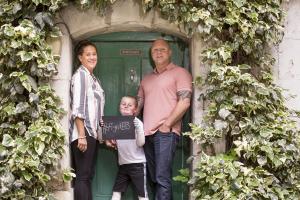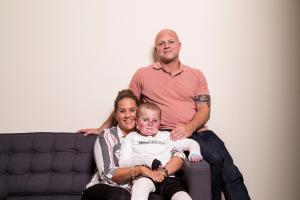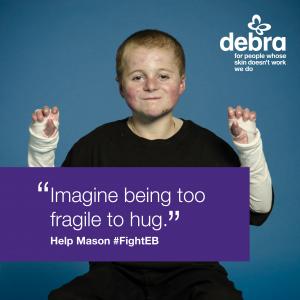DEBRA
Kerry White, 40, from Hampshire explains why DEBRA means the world to her family
Taking care of a baby can be difficult for any parent. However, for Kerry White and her son, Mason, now 11, it was a huge challenge. “Mason has a condition called epidermolysis bullosa (EB), a genetic skin condition that means the slightest touch can cause his skin to blister or come off entirely. We had to learn how to care for a child we couldn’t cuddle or kiss, and how to dress him in a way that wouldn’t blister his skin. We weren’t allowed to bathe him, couldn’t give him a dummy, as it would blister his lips, and couldn’t take our eyes off him for a minute in case he rubbed his face, which would then become a big open wound.” Mason was also born without skin on his right leg or foot and skin missing from his chest. “It was a huge shock. He had no toes on his foot and his little leg was purple and looked like a raw piece of meat.” Unsure what to do, the medical team sent photographs to Great Ormond Street Hospital (GOSH), and a specialist from its EB department came to look at Mason the next day. A biopsy showed he had the most severe form of recessive dystrophic epidermolysis bullosa, which causes severe and widespread skin blistering and a high risk of skin cancer. “We were told he basically had no type 7 collagen in his body, so he was fragile internally and externally. It was when I first heard the term ‘butterfly children’, so called because their skin is as fragile as butterfly wings.” Kerry and her husband, Rod, were warned not to look the condition up on the internet. “We ended up looking and it was heartbreaking. To learn your son has a life-threatening condition is the worst thing.”
After around four weeks in hospital, Mason was allowed home. “We already had four children between us, but it was a whole different ball game learning how to take care of Mason. He wouldn’t latch on to breastfeed, so the hospital gave me a special long teat for a bottle to stop any friction on his lips. However, because of the damage in his throat, he was constantly aspirating milk into his lungs and was in and out of hospital with bronchiolitis. He had also started losing his fingernails and was coughing up blisters from his throat.” Then, at six months old, Mason coughed up the lining of his throat. “We rushed him to hospital and he was taken to intensive care. They took the skin away but we were told he wasn’t going to make it. “Our local hospital contacted GOSH again, but the surgeon who deals with children who have EB wasn’t around to do operations. We waited two weeks and could see that Mason was wasting away in front of us. He couldn’t eat anything and was getting thinner and more dehydrated.” Eventually, another surgeon at GOSH stepped forward and said he would attempt the surgery. “He gave Mason a gastrostomy – where a feeding device was inserted into the stomach so he could be fed directly through this – then sewed up his stomach to stop any acid reflux, which was blistering his oesophagus. After seven hours of surgery Mason came out, and is thankfully still here now to tell the tale!”
“Mason’s been through so much but is one tough little cookie! He doesn’t let his condition stop him from doing things”
Today, Mason is still fed through a gastrostomy and needs extra support with a variety of things. “He’s had 26 operations on his hands but has lost function in them because of all the scarring. As a result, he requires support with personal care and someone to scribe for him at school. We also have a carer at night to help with his pain medication and nebuliser (which keeps his airways open at night) and to watch him to make sure he doesn’t scratch in his sleep and damage his skin. Because Mason’s whole body is permanently healing, he is always incredibly itchy. “Mason has also lost all his toes, so has an electric wheelchair and mobility scooter to get him around at school. He spends three to four hours every day in his medical room after school with us removing bits of skin and putting his bandages on.” Despite all this, Mason remains incredibly positive. “He is a very confident and popular little boy, and is one tough little cookie! He is very bright and top of his classes in school, and doesn’t let his condition stop him from doing things.” Kelly believes the support and care offered by GOSH, which is part-funded by DEBRA – the national charity that supports people affected by EB – is to thank for Mason’s high quality of life.
“To know that there are people out there willing to support you – and who are also funding research into treatments – is what gives us hope”
“We go to GOSH every three months and the care is amazing. They have a dedicated team including dieticians, physiotherapists, a psychologist, occupational therapists and specialist doctors and nurses, who are the best. They’re always at the end of the phone to help, and I don’t know what we’d do without them.” The family have also benefited from DEBRA’s support services. “They have been there for us every step of the way, helping us financially with things Mason needed, and providing emotional support via their brilliant welfare officer and counsellor. They’ve also helped with practical issues like filling in benefits forms for us and helping me get a blue badge. “When you’ve got a child with a disability you don’t always know what help is available, but they can identify what we need and are entitled to and point us in the right direction. To know there are people out there willing to support you – and who are also funding research into treatments that might give our son a better life – is just amazing. It gives us hope as a family and helps us to keep going.”
DEBRA: Enhanced EB health care for children at GOSH
TOTAL RAISED: £37,042
Money raised in The Candis Big Give will go towards funding for children with EB at GOSH, which treats up to 500 seriously ill young EB patients in the UK every year. This care includes enhanced nursing provision for children through weekly clinics, outreach support for those newly diagnosed and regular home visits for wound care and pain management techniques. Children will also have access to a specialist dietician and podiatrist, as walking is a huge challenge for most children with EB, as is swallowing and digesting food.
Visit debra.org.uk to find out more
How Buying a Subscription Helps – In 2020, Candis Club will donate at least £250,000 from members’ magazine subscription revenue to health charities taking part in The Candis Big Give.
Any additional funds will go tocharities at the discretion of the General Committee of Candis Club.




Leave a Reply
Please login or register to leave a comment.